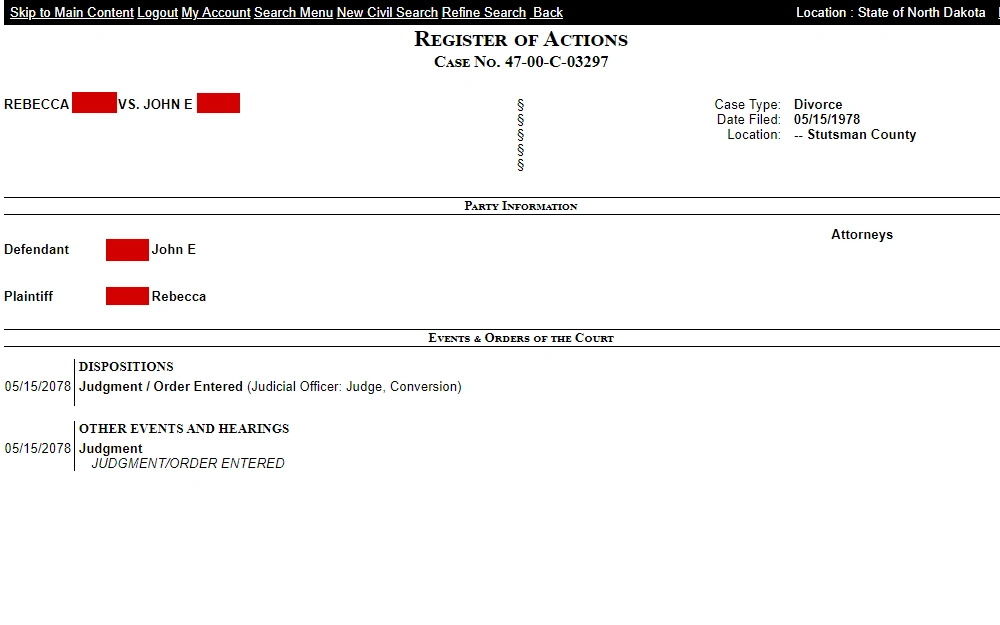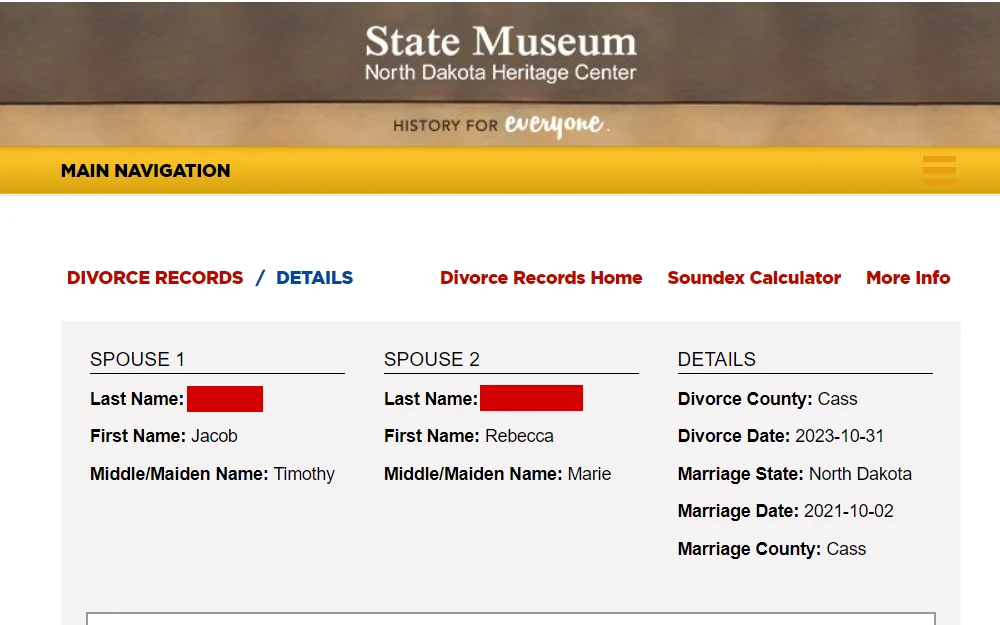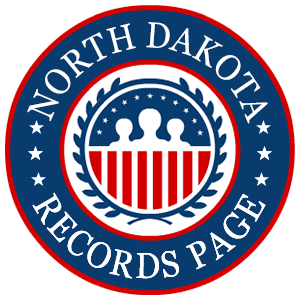Find and access free North Dakota divorce records using a variety of tools. Information about spouses, when they married and separated, and details about how their divorce unfolded is readily available to anyone.
The North Dakota Open Records Statute established that citizens must be able to access, inspect, and copy public records information as they see fit, without any explanation necessary. Marital records — including divorce information — are part of the documents that must be readily available to all.
Some records are free online, while some might require a nominal fee or an in-person visit to an agency. This resource will help concerned individuals uncover the North Dakota divorce information they seek.
Are Divorce Records Publicly Available in North Dakota?
Accessing information about divorces that happened in North Dakota is not a difficult task. Divorce records are public and, consequently, available through different channels that citizens can utilize depending on what information they wish to uncover.
According to the Vital Records Office, a division of the North Dakota Health and Human Services, official divorce records can only be obtained at the Clerk’s Office of the county where the lawsuit was filed.1
However, it’s possible to uncover information (including details about each case) for free using the courts’ search system, which will be described in this article.
For those who want to know more about the law that regulates divorces in the state, the North Dakota Courts website can offer some clarification as well.2
According to the CDC (the Centers for Disease Control and Prevention), North Dakota has a rate of 2.9 divorces per 1000 individuals.

In fact, the US Census indicates that about 10% of the North Dakota population is divorced. That number doesn’t include those who have separated but remain married (as in a mensa et thoro separation) or who are widowed individuals.

About 32% of the state’s population never married at all, and over 2000 divorces were filed in North Dakota in 2022.5
North Dakota is a no-fault state when it comes to divorces. It means that all someone needs to do to file for a divorce is make a statement that the couple has irreconcilable differences and their marriage can’t continue. More about how to file for divorce in North Dakota will be discussed below.
The state of North Dakota doesn’t recognize common-law marriages. Indeed, the state is quite strict on this matter and won’t even recognize common-law marriages established in states that accept it as a legally binding relationship.
For that reason, both those who wish to cohabitate with a partner in North Dakota without having proper matrimony and those relocating from a state where their common-law marriage would be recognized must look for solutions to protect their assets and family relations.
One good option for those couples is to hire an attorney to draft a cohabitation agreement. A well-written agreement works like a binding contract and addresses the needs and expectations of both parties in the relationship. Should something happen, or in the case of a breakup, this agreement would stand in court and ensure the couple is protected and that whatever they’d agreed on should be honored.
For those searching for a marital record or a divorce decree, however, it’s important to remember that common-law marriages and any sort of cohabitation agreement would not come up in any search. Simply put, just like there aren’t common-law marriages in North Dakota, there aren’t common law divorces too.
How To Find North Dakota Divorce Records & Ex-Spousal Information
People in the state of North Dakota can run a free public divorce records search utilizing a Public Search system. This online tool allows citizens to look for court records throughout the state at no cost but requires that the user choose the county they want to search.
Since picking a county is mandatory, it’s important to know which area is the repository for the divorce records they intend to find.

For a successful search, after selecting a county to search, the user must choose which cases to look up. To uncover divorce information, users must select “Civil, Family, and Probate Case Records.”
After that initial selection, users are able to perform searches by name, first and last. It’s also possible to add more information to narrow the search, such as a date range or a case type.
Results will show detailed information about the case, including when the divorce happened and how the lawsuit unfolded. The information presented is valuable, but it’s not certified or official. How to obtain official copies of divorce records will be discussed below.
Also, the Public Search System won’t work if the county where the divorce was filed is unknown. In those cases, when the searcher needs to discover where to look for information, they can use the North Dakota Heritage Center and State Museum search tool.

This tool works well when only the names of the spouses are known (and even when only one name is known) and gives information about which county handled the case. This search engine won’t yield detailed information, but it’s a good starting point when little data is available for starters. This public divorce records search is free for all.
If an official record is needed, such as a divorce certificate, interested citizens must contact the Clerk’s Office for the county where the divorce was filed and granted. According to the Vital Records Office, those offices are responsible for providing this service, and it’s not possible to obtain those official records through any state agency.
To help searchers find the correct contact information for the location they should contact, the Vital Records Office provides a list of Clerk’s Offices in North Dakota. They’re also available by phone or email if anyone has questions about those records:
North Dakota Vital Records Office
600 East Boulevard Ave. Dept.
301 Bismarck, ND 58505-0200
Phone: 701.328.2360
Email: [email protected]
Acquiring Divorce Records Through Counties in North Dakota
Contacting the local County Clerk’s Office is the only way to obtain an official divorce certificate in North Dakota.
Therefore, it’s very important that the individual interested in obtaining records copies knows which county holds the information they need. This article will provide information on contacting the three largest counties in North Dakota.
The Cass County Clerk of District Court is responsible for supporting local citizens who have filed for divorce under their jurisdiction.8 They provide official certificates, including divorce records, to anyone who might be interested in them. The Clerk’s Office can be contacted in person, by mail or by phone.
A comprehensive price list of all the services provided by the office is available online. Regular copies cost $1 per page and certified copies cost $5 for the first page and $ 2 for each additional page. Whenever a document must be emailed or faxed, they charge $3.
This is how they can be contacted by phone or in person:
Cass County Clerk of District Court
East Central Judicial District
211 9th St. South
Fargo, ND 58103
Phone: 701.451.6900
To contact them by mail, citizens should use the following address:
Cass County Clerk of District Court
P.O. Box 2806
Fargo, ND 58108-2806
The Burleigh County Clerk of District Court helps citizens in person and by mail.9 They’re also available by phone, fax, and email. This is their contact information:
Burleigh County Clerk of District Court
South Central Judicial District
514 E. Thayer Ave.
Bismarck, ND 58501
Phone: 701.222.6690
Fax: 701.222.6758
Email: [email protected]
The Grand Forks County Clerk’s Office is available to the people in person, by mail, by phone, or by email, as follows:10
Grand Forks County Clerk’s Office
124 S. 4th St.
Grand Forks, ND 58201
Phone: 701.878.2700
Email: [email protected]
Tracking Down Free Divorce Archives in North Dakota for Genealogy Purposes
In some cases, the local County Clerks have historic divorce records in their archives. When attempting to perform genealogical research, contacting the county where the divorce was originally filed (even if many decades ago) may pay off. It’s certainly worth the try.
However, the State Historical Society of North Dakota Archives also have some of those records available to the public at their location.11 When a citizen needs assistance going through historical records, the Archives can be a good resource.
The North Dakota Archives holds historical records that go back as far as the late 1800s. To help searchers, they provide an informative list that contains every county in the state and, next to it, the years of records are available at their office. This way, searchers can learn ahead of time if the records they need are readily available to them or not.
If someone believes that the records they’re looking for are part of what’s accessible at the State Archives, they can contact the office in person, by phone, or by email using the following information:
State Historical Society of North Dakota
Archives Office
612 E. Blvd. Ave.
Bismarck, ND 58505
Phone: 701.328.2666
Email: [email protected]
Another good tool is offered to the public by the North Dakota Heritage Center and State Museum.12 They have an online search tool that helps citizens look up most divorce records available in the state. This tool results from a collaboration between the Museum and the Vital Records Office.
The Museum’s divorce index covers recent and historical divorces, and although it won’t provide detailed information, it’ll lead any interested searcher in the right direction if they wish to deepen their research. If anything, it’s a good starting point for any research involving divorce records.
How To Get a Divorce in North Dakota: Filing & Addressing Petitions
Divorces in North Dakota are governed by Chapter 14-05 of the State Statutes. The North Dakota Court System breaks down the details of the legislation, providing the people with a clear guideline for how forces must be handled in the state.
Although citizens should file for divorce in the county they reside in, this fact sheet is a helpful tool for ensuring everything is being done correctly.
North Dakota doesn’t require that one of the spouses file for an at-fault divorce. Although it is possible to file for divorce alleging abandonment or cruelty, it’s also possible to simply cite irreconcilable differences and opt for a no-fault divorce. Most people choose that option since no further explanation is needed.
In order to file for divorce, at least one of the spouses must have been residing in North Dakota for six months. This is the residency requirement, and if a waiver is needed, it can be petitioned to the court. In some cases, they make an exception as long as by the time the divorce is granted, the residency requirement is met.
Filing for a divorce in North Dakota costs $80.
When the former couple agrees on everything surrounding the divorce filing (including custody, child support, etc.), it’s possible to file for an uncontested divorce. In North Dakota, such divorces tend to be granted quickly and usually don’t require a hearing. There’s no doubt that when the couple agrees on the divorce terms, this can save them time and money.
However, real life isn’t always that simple; when there’s a disagreement between the former spouses and the help of the court is needed to determine the details of the divorce, one of the spouses can start the process and file for a contested divorce.
When someone is served with divorce papers, it’s important to understand that they don’t have to agree to or accept the terms proposed in the lawsuit. Usually, after being summoned, the respondent has 21 days to respond, and it’s advisable to take this time to hire an attorney.
A good, experienced attorney can provide reasonable counsel as to how to respond to the summons, making sure that the respondent doesn’t forfeit any of their rights. In fact, both parties would benefit from having an attorney, even when the divorce is settled through arbitration.
If seeking information or trying to file for a marriage dissolution, free North Dakota divorce records are available and accessible to all citizens, so everyone can get the support they need.
References
1Certified Copies of Divorce Records. North Dakota Department of Health and Human Services. (2022) Retrieved November 10, 2023, from <https://www.hhs.nd.gov/vital/divorce>
2Divorce. North Dakota Supreme Court. (n.d.) Retrieved November 10, 2023, from <https://www.ndcourts.gov/legal-self-help/divorce>
3Key Health Indicators. National Center for Health Statistics. (n.d.) Retrieved November 10, 2023, from <https://www.cdc.gov/nchs/pressroom/states/northdakota/nd.htm>
4Marital Status. United States Census Bureau. (n.d.) Retrieved November 10, 2023, from <https://data.census.gov/profile/North_Dakota?g=040XX00US38#families-and-living-arrangements>
5North Dakota Fast Facts 2022. North Dakota Department of Health and Human Services. (2022) Retrieved November 10, 2023, from <https://www.hhs.nd.gov/sites/www/files/documents/DOH%20Legacy/Vital/ff2022.pdf>
6Register Of Actions. North Dakota Supreme Court. (n.d.) Retrieved November 10, 2023, from <https://publicsearch.ndcourts.gov/CaseDetail.aspx?CaseID=699919>
7Divorce Records Details. State Historical Society of North Dakota. (2023) Retrieved November 10, 2023, from <https://statemuseum.nd.gov/divorces/details?UNIQUE%20ID=2bae85797c9711eea08d00224843a3b6>
8East Central Judicial District. Cass County, North Dakota. (n.d.) Retrieved November 10, 2023, from <https://www.casscountynd.gov/Home/Components/FacilityDirectory/FacilityDirectory/1061/318>
9Burleigh County. North Dakota Supreme Court. (n.d.) Retrieved November 10, 2023, from <https://www.ndcourts.gov/court-locations/burleigh-county>
10Clerk of Courts. Grand Forks County. (n.d.) Retrieved November 10, 2023, from <https://www.gfcounty.nd.gov/our-county/district-court-clerk-of-courts>
11Vital Records: Birth, Death, Marriage, and Divorce. State Historical Society of North Dakota. (2023) Retrieved November 10, 2023, from <https://www.history.nd.gov/archives/vitalrecords.html>
12Divorce Records. State Historical Society of North Dakota. (2023) Retrieved November 10, 2023, from <https://statemuseum.nd.gov/divorces>
